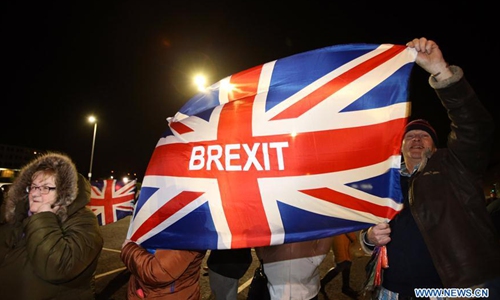Bad Brexit UK-EU money mood sets in
Source:AFP Published: 2020/5/20 17:33:40
Failed agreements between London and Brussels rattle Europe to core

Pro-Brexit supporters celebrate Brexit outside Stormont in east Belfast, Northern Ireland, Britain on Jan. 31, 2020. Britain officially left the European Union (EU) at 11 p.m. (2300 GMT) Friday, putting an end to its 47-year-long membership of the world's largest trading bloc. (Photo by Paul McErlane/Xinhua)
Britain on Tuesday accused the European Union (EU) of making a sub-standard offer in post-Brexit trade talks, as it urged Brussels to give ground on its proposals to strike a quick deal.
UK chief negotiator David Frost told his opposite number, Michel Barnier, that the EU was not offering a "fair free trade relationship between close economic partners."
Instead, the deal on the table was "a relatively low-quality trade agreement coming with unprecedented EU oversight of our laws and institutions," he wrote in a four-page letter.
"It does not have to be like this," he added.
A third round of talks broke up last week, with both sides complaining of deadlock in key areas such as EU access to UK fishing grounds, governance, and the so-called level playing on common standards and competition.
"The EU essentially wants us to obey the rules of their club even though we're no longer members," Cabinet Office minister Michael Gove said in parliament earlier on Tuesday.
But he told MPs a free trade agreement was still possible - as long as the EU moved away from its "ideological fastness" and recognized Britain "as a sovereign equal."
Britain left the EU in January, nearly four years after a landmark referendum in June 2016 that saw voters choose to end nearly 50 years of integration with Europe.
It remains bound by EU rules until December 31 as it tries to secure terms for a new relationship with its biggest trading partner.
A fourth round of negotiations is penciled in for early June, just weeks ahead of a deadline for an extension to the talks that Prime Minister Boris Johnson has emphatically ruled out.
Johnson's office released Frost's letter to Barnier after finally publishing a raft of its draft legal texts used in the talks, and a new global tariff regime for January 2020.
"Transparency is very important in negotiations," Barnier responded, pointing out that the EU Commission published its documents more than two months ago.
Frost again outlined Britain's position - that it wants to leave the EU single market and customs union, and is eyeing a free trade agreement (FTA) based on those that Brussels has already struck with countries, such as Canada.
He questioned EU demands for "additional, unbalanced and unprecedented provisions... as a precondition for agreement between us."
"We find it hard to see what makes the UK, uniquely among your trading partners, so unworthy of being offered the kind of well-precedented arrangements commonplace in modern FTAs," he added.
Level-playing field proposals, particularly European Court of Justice oversight on state aid rules, would be unacceptable to any democratic country, the chief negotiator said.
AFP
Posted in: EUROPE,EYE ON WORLD